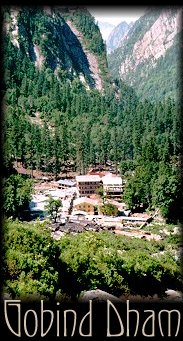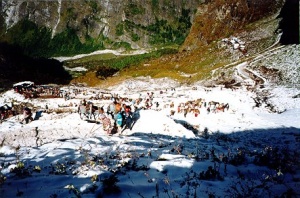Gurdwara Gobind Dham: Difference between revisions
No edit summary |
Allenwalla (talk | contribs) mNo edit summary |
||
| (6 intermediate revisions by 3 users not shown) | |||
| Line 1: | Line 1: | ||
[[Image:Dhampic.jpg|thumb|right|300px|Gobind Dham]] | [[Image:Dhampic.jpg|thumb|right|300px|Gobind Dham]] | ||
This beautiful Gurdwara | This beautiful Gurdwara, has been built at a very beautiful place by the Hemkunt-Trust where the Rivulet Lakshman and the Rivulet Pushpa meet each other. The gurdwara is located in the village of Ghaghria. This magnificent and beautiful Gurdwara is the first to be built at a height of ten thousand feet above the sea level. The Gurwara's surroundings are very peaceful and calm. The natural beauty of the site creates a spiritual awakening and a Music of Divine words plays within one's soul. The Gurdwara is 13 kilometers away from [[Gurdwara Gobind Ghat]]. | ||
Sant Sohan Singh constructed the dharamshal in 1938. During its construction Baa Modan Singh lived in a hut made of the bark of Cheel Tree during the area's icy winters. In 1961 Hemkunt-Trust made this magnificient shrine. Sant Thandi Singh played an important role in sewa of the shrine. | |||
From here two | The site can be reached by Horse or mule, in a palki carried by 4 men, in a tokri(a manpowered Bucket lift) and last, for those in shape, on foot. Besides the serai there are many hotels nearby to stay in. | ||
This is last halt for the devotees going to [[Hemkunt Sahib]]. Here thousands of pilgrims can stay at night and there is no scarcity of blankets and beds. A Guru ka Langar (a free kitchen) remains open at the service of the devotees twenty-four hours daily. On hearing this music the devotee finds bliss and sings the praise of God. Man forgets his worldly affairs, instead the light of Lord sparkles from his head. Here man realizes the creator and His creation. Here one discards all their cleverness and meditates on the name of God. Everyone feels as if they have entered the house of Guru Gobind Singh. They utter again and again; Dhan Guru Gobind Singh, Dhan Guru Gobind Singh. | |||
From here there are two paths, one leads to Hemkunt Sahib and the other leads to the valley of flowers. Foreign tourists usually go to the valley of flowers to take in its beauty, sometimes for research. | |||
==To Hemkunt Sahib== | ==To Hemkunt Sahib== | ||
After a night here, in the morning the pilgrims start for their final goal of paying homage to Hemkunt Sahib. It is very difficult to stay at Hemkunt Sahib, where there is no serai, so pilgrims try departing early so that they can return the same day. The distance between Gobind Dham and Hemkunt Sahib is about six to seven kilometers. Though the steep trek is difficult, the long held, heartfelt desire of seeing this place of dreams gives the pilgrims the strength to climb such a difficult path. The days when one had to take grab onto the rocks and boulders and cling tentatively to limbs and shrubs to reach Hemkunt Sahib are long gone as the Hemkunt-Trust has greatly improved the path and its safety. | |||
When people begin the climb, it does not seem so difficult. But after half a kilometer the incline becomes so steep that one has to work hard for each single step. But as the saying goes, where there is a will, there is a way. The eagerness to pay homage to Guru Gobind Singh's 'Tapo-Bhoomi' makes all difficulties fade to the background. Halfway to Hemkut Sahib one reaches the timber line and the deep forest ends. Suddenly we are amazed as the breath taking vistas open before us. There is a flower which grows only at this high altitute in among the rock fissures. The flower reminds one of the lotus which springs whose roots though mired in mud climbs out of the water to open in all its allegorical splendor, the beautiful lotuslike flower of the mountains is called Braham Kanwal. | |||
[[Image:Brahama kamal.jpg|thumb|left|105px|Braham Kanval]] | |||
Now, along the path the flower grows in the rocks and there are also some trees of Bhoj Patar’ When we ascend further we are wonder struck as we have our first glimpse of Sri Hemkunt Sahib. At places we have only a view the holy Sarovar the next step we can see the lotus shaped Gurdwara. We feel as if we have reached heaven. | |||
[[Image:Path3.jpg|thumb|right|300px|Gobind Dham, from Hemkunt sahib]] | [[Image:Path3.jpg|thumb|right|300px|Gobind Dham, from Hemkunt sahib]] | ||
When we | |||
When we finally realize that we have actually reached Tapo-asthan of Guru Gobind Singh and we see in our imagination the true Guru Gobind Singh on all sides we forget ourselves. We feel as if we have become dead and are lying in the lap of Sat Guru Gobind Singh Ji. It is such a rare experience for one to feel in his life. Such a scene and blissful hour may never come again. One can imagine the site, again and again, in their imagination, but a first hand view of Tapo-asthan and the surrounding area becomes a myth for the Pilgrim. A man will forever seek to feel such peace and tranquilly again. But who knows when that hour might come again. After reaching their goal the Pilgrims bathe in the Sarovar and then go to the Gurdwara to pay homage to the holy Tapo-Asthan. | |||
[[Category:Gurdwaras In Uttaranchal]] | [[Category:Gurdwaras In Uttaranchal]] | ||
{{Journey Hemkunt Sahib}} | {{Journey Hemkunt Sahib}} | ||
Latest revision as of 07:51, 31 March 2008
This beautiful Gurdwara, has been built at a very beautiful place by the Hemkunt-Trust where the Rivulet Lakshman and the Rivulet Pushpa meet each other. The gurdwara is located in the village of Ghaghria. This magnificent and beautiful Gurdwara is the first to be built at a height of ten thousand feet above the sea level. The Gurwara's surroundings are very peaceful and calm. The natural beauty of the site creates a spiritual awakening and a Music of Divine words plays within one's soul. The Gurdwara is 13 kilometers away from Gurdwara Gobind Ghat.
Sant Sohan Singh constructed the dharamshal in 1938. During its construction Baa Modan Singh lived in a hut made of the bark of Cheel Tree during the area's icy winters. In 1961 Hemkunt-Trust made this magnificient shrine. Sant Thandi Singh played an important role in sewa of the shrine.
The site can be reached by Horse or mule, in a palki carried by 4 men, in a tokri(a manpowered Bucket lift) and last, for those in shape, on foot. Besides the serai there are many hotels nearby to stay in.
This is last halt for the devotees going to Hemkunt Sahib. Here thousands of pilgrims can stay at night and there is no scarcity of blankets and beds. A Guru ka Langar (a free kitchen) remains open at the service of the devotees twenty-four hours daily. On hearing this music the devotee finds bliss and sings the praise of God. Man forgets his worldly affairs, instead the light of Lord sparkles from his head. Here man realizes the creator and His creation. Here one discards all their cleverness and meditates on the name of God. Everyone feels as if they have entered the house of Guru Gobind Singh. They utter again and again; Dhan Guru Gobind Singh, Dhan Guru Gobind Singh.
From here there are two paths, one leads to Hemkunt Sahib and the other leads to the valley of flowers. Foreign tourists usually go to the valley of flowers to take in its beauty, sometimes for research.
To Hemkunt Sahib
After a night here, in the morning the pilgrims start for their final goal of paying homage to Hemkunt Sahib. It is very difficult to stay at Hemkunt Sahib, where there is no serai, so pilgrims try departing early so that they can return the same day. The distance between Gobind Dham and Hemkunt Sahib is about six to seven kilometers. Though the steep trek is difficult, the long held, heartfelt desire of seeing this place of dreams gives the pilgrims the strength to climb such a difficult path. The days when one had to take grab onto the rocks and boulders and cling tentatively to limbs and shrubs to reach Hemkunt Sahib are long gone as the Hemkunt-Trust has greatly improved the path and its safety.
When people begin the climb, it does not seem so difficult. But after half a kilometer the incline becomes so steep that one has to work hard for each single step. But as the saying goes, where there is a will, there is a way. The eagerness to pay homage to Guru Gobind Singh's 'Tapo-Bhoomi' makes all difficulties fade to the background. Halfway to Hemkut Sahib one reaches the timber line and the deep forest ends. Suddenly we are amazed as the breath taking vistas open before us. There is a flower which grows only at this high altitute in among the rock fissures. The flower reminds one of the lotus which springs whose roots though mired in mud climbs out of the water to open in all its allegorical splendor, the beautiful lotuslike flower of the mountains is called Braham Kanwal.
Now, along the path the flower grows in the rocks and there are also some trees of Bhoj Patar’ When we ascend further we are wonder struck as we have our first glimpse of Sri Hemkunt Sahib. At places we have only a view the holy Sarovar the next step we can see the lotus shaped Gurdwara. We feel as if we have reached heaven.
When we finally realize that we have actually reached Tapo-asthan of Guru Gobind Singh and we see in our imagination the true Guru Gobind Singh on all sides we forget ourselves. We feel as if we have become dead and are lying in the lap of Sat Guru Gobind Singh Ji. It is such a rare experience for one to feel in his life. Such a scene and blissful hour may never come again. One can imagine the site, again and again, in their imagination, but a first hand view of Tapo-asthan and the surrounding area becomes a myth for the Pilgrim. A man will forever seek to feel such peace and tranquilly again. But who knows when that hour might come again. After reaching their goal the Pilgrims bathe in the Sarovar and then go to the Gurdwara to pay homage to the holy Tapo-Asthan.
| JOURNEY SHRI HEMKUNT SAHIB |
ROUTE 1 - Haridwar ROUTE 2 - Paonta Sahib Rishi Kesh ♣♣ Dev prayag ♣♣ Srinagar ♣♣ Rudra Prayag ♣♣ Karna prayag ♣♣ Nanda prayag ♣♣ Joshi Math ♣♣ Vishnu prayag ♣♣ Gurudwara Gobind ghat ♣♣ Gurudwara Gobind Dham ♣♣ Hemkunt Sahib |



